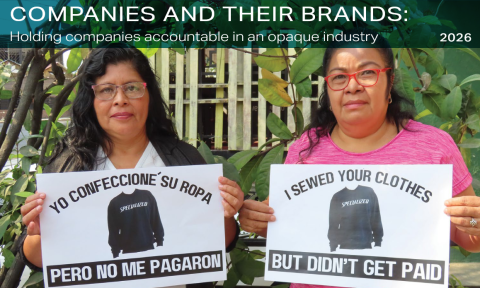
Photo: Pay Your Workers
MSN’s Companies and Brands Research Tools, updated in January 2026, are designed to assist trade unions, researchers, and women’s and labour rights organizations in identifying leverage points for brand engagement and/or campaigns to address labour rights violations.
The tools include two complementary documents:
- Companies and their Brands: Holding companies accountable in an opaque industry profiles in an easy-to-read chart dozens of global garment companies and their owned brands, indicating which companies:
- own manufacturing facilities where their products are made;
- disclose supply chain information;
- produce collegiate apparel;
- are members of a multi-stakeholder initiative; and/or
- are publicly traded companies.
- Companies and their Brands: Factory disclosure lists provides direct links to the supply chain information published by the companies on the chart. Also includes directions on how to use two public databases for research and/or campaigns: the Open Supply Hub (OS Hub) and the Worker Rights Consortium (WRC) database of factories in university supply chains.
The garment industry has seen massive changes in the five-year period between 2020 and 2025, with disastrous impacts for low-wage garment workers in supply chains across the globe.
In this updated 2026 Companies and Brands Tools, we highlight two trends from this period that could impact efforts to seek remediation for violations of workers’ rights: 1) significant factory closures and mass layoffs in Central America; and 2) the expansion of private-equity controlled brand management companies like Authentic Brands Group (ABG).
New research and campaign strategies have been and will continue to be crucial for addressing labour rights violations and holding companies responsible for upholding labour rights in their supply chains.
Companies and Brands Research Tools
- Companies and their Brands: Holding companies accountable in an opaque industry (PDF, January 2026)
- Companies and their Brands: Factory disclosure lists (PDF, January 2026)